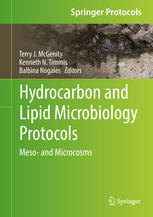

Most ebook files are in PDF format, so you can easily read them using various software such as Foxit Reader or directly on the Google Chrome browser.
Some ebook files are released by publishers in other formats such as .awz, .mobi, .epub, .fb2, etc. You may need to install specific software to read these formats on mobile/PC, such as Calibre.
Please read the tutorial at this link: https://ebookbell.com/faq
We offer FREE conversion to the popular formats you request; however, this may take some time. Therefore, right after payment, please email us, and we will try to provide the service as quickly as possible.
For some exceptional file formats or broken links (if any), please refrain from opening any disputes. Instead, email us first, and we will try to assist within a maximum of 6 hours.
EbookBell Team

4.3
8 reviewsThis Volume describes methods for simulating natural environments by using reproducible and controllable meso- and microcosm experiments to analyse hydrocarbon-degrading microorganisms and to test hypotheses. It presents important aspects of the preparation of experimental set-ups, hydrocarbon application and sampling, and features protocols for experiments with different types of samples, such as biofilms, aquatic systems (e.g. groundwater, streams), and sediments, including oscillating oxic-anoxic mesocosms, as well as for in-situ experimentation in subtidal and deep sediments. Two chapters are dedicated to cultivation under high-pressure conditions, and several chapters include protocols for processing samples for downstream chemical, microbial or activity analyses. Several of the approaches presented are generic and will benefit anyone embarking on designing meso- and microcosm experiments. <
Hydrocarbon and Lipid Microbiology Protocols
There are tens of thousands of structurally different hydrocarbons, hydrocarbon derivatives and lipids, and a wide array of these molecules are required for cells to function. The global hydrocarbon cycle, which is largely driven by microorganisms, has a major impact on our environment and climate. Microbes are responsible for cleaning up the environmental pollution caused by the exploitation of hydrocarbon reservoirs and will also be pivotal in reducing our reliance on fossil fuels by providing biofuels, plastics and industrial chemicals. Gaining an understanding of the relevant functions of the wide range of microbes that produce, consume and modify hydrocarbons and related compounds will be key to responding to these challenges. This comprehensive collection of current and emerging protocols will facilitate acquisition of this understanding and exploitation of useful activities of such microbes.